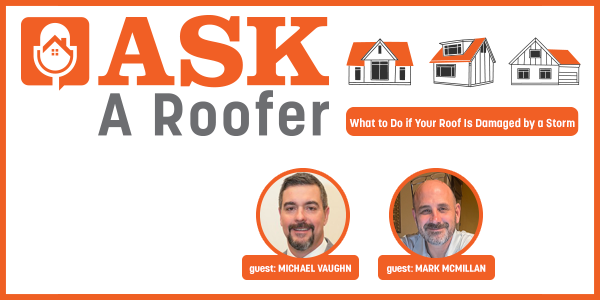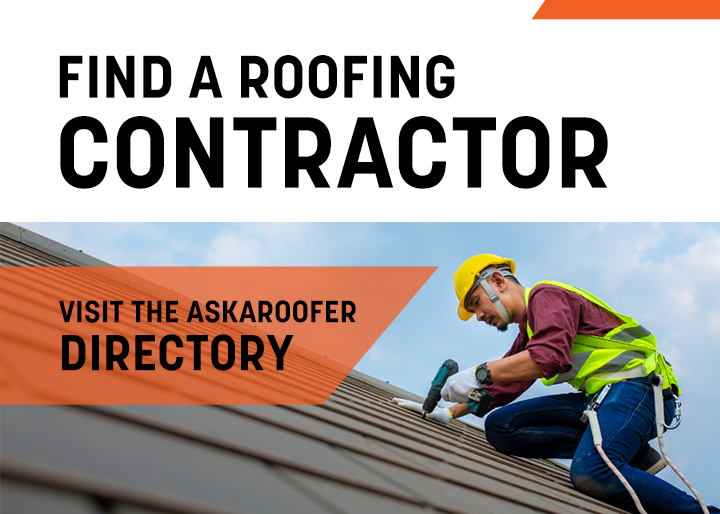What to Do if Your Roof Is Damaged by a Storm With DaVinci Roofscapes - PODCAST TRANSCRIPTION

Editor's note: The following is the transcript of an live interview with Mike Vaughn from DaVinci Roofscapes and Mark McMillan of Horn Brothers Roofing. You can read the interview below or listen to the podcast.
Megan Ellsworth:
And my name is Megan Ellsworth, a roofing enthusiast, and we are with Roofer's Coffee Shop.
Alice Reynolds:
We want to share the knowledge of the contractors we work with every day with home and building owners.
Megan Ellsworth:
So please join us as we talk with industry experts, roofing contractors, business owners, and more, to answer all of your burning questions about the health and maintenance of your roof.
Megan Ellsworth:
Hello, everyone. Welcome to the first episode of the Ask A Roofer podcast. My name's Megan Ellsworth and-
Alice Reynolds:
I'm Alice Reynolds.
Megan Ellsworth:
And today we're going to be talking with Mike Vaughn from DaVinci Roofscapes, and Mark McMillan of Horn Brothers Roofing. And we're really excited, this is the first episode. We're about to learn some stuff about how to protect your roof from storm damage. And hello guys, how are you?
Mike Vaughn:
Fantastic. How are you doing?
Megan Ellsworth:
Doing all right. So Mark and Mike, why don't you guys go ahead and introduce yourselves. We'll just start with Mike maybe.
Mike Vaughn:
Okay. Yeah. Great. Yeah. It's Mike Vaughn. I reside here in Denver. I'm the sales director of DaVinci Roofscapes. Been here about four and a half years. Territory that I'm covering is around Illinois to California. Been in the roofing business for going on 12 years. Been in building materials for just the 20 years. And yeah, I ended up at DaVinci because just essentially the product. Roofing has a lot of different materials and a lot of its commodity, but the idea of working with a strong synthetic roofing material that's very high end and aesthetically pleasing was very enticing to me, and I'm very happy to be here. It's been a great four and a half years. So, yeah, thanks for having us. Can't wait to talk more about roofing.
Megan Ellsworth:
Yeah. Mark, why don't you give us a little backstory on yourself.
Mark McMillan:
All right, my name is Mark McMillan. I'm the sales manager for Horn Brothers Roofing in Denver, Colorado. I've been in roofing for about nine years. I was a complete and utter accident. I just kind of stumbled over it. Never thought I would be in roofing. I've done a lot of building material jobs. Like I worked for FEMA for a number of years as an inspector, did some other things like that. We've been around for about 30 years. We specialize in a lot of high end products, more high end than not high end, which is one of the reasons why we have such a good partnership with DaVinci. Mostly with products that hopefully are your last roof, not your first, because we work with products that can withstand the hail storms and the wind storms that we get in Colorado.
Megan Ellsworth:
Awesome. That's great.
Alice Reynolds:
Well, to get into it, I know you're both from Denver, but with continuous storms, bad storms in the Midwest, and then the strong hurricane seasons along the coast, what does that mean to homeowners and their roofs?
Mark McMillan:
Well, speaking of hail in the Denver area and the other storms that we get here, the main thing that it means is, I mean, there's a lot of different branches that go different directions, but obviously the main thing is you want a product that can withstand at least the smaller hail, which is some of the IR four's in some of the asphalt roofing. And then for the larger storms, which is what we get, you would probably want to be in some of the higher end products like the synthetics or the steel to actually withstand those storms. It does branch out to like deductibles are changing drastically on homeowners. They used to be 500, a thousand dollars per deductible after a storm. Now they're all going to like one and 2%. So actually having a damaged roofing system can cost you a very large amount of money out of your own pocket now, as opposed to 10, 15 years ago.
Mike Vaughn:
I'd add onto that just a couple things, everything Mark said is a hundred percent right. The IR to maybe people who might not know what that is, that means Impact Resistant Roof. And that's a roof that's gone through a test that shows that they can withstand impact how, and different companies will have different ratings for the roof. And the class four IR is the highest one that you can achieve at this point right now. And so I think that's very important for homeowners to look at when they are in those storm areas that they're putting on a roof like that, like mark said. You get some advantages with that with your insurance company too. Sometimes you're getting discounts along with roofs that have IR rated. And when it comes to hurricanes, neither one of us are really in that area as much as the tornadoes in the hail belt.
Mike Vaughn:
But, I think when you're looking in areas like that, you want to look at the same type of certifications that pertain to those areas. And like, one of them is one of the strongest and it'll go from windows to roofing, to siding. All of it is a Miami-Dade rating and that's one of the highest you can get. And so certain roofing materials can achieve that and certain ones can't. When it comes to like those two things, IR and Miami-Dade, us at DaVinci are able to achieve both those due to certain installation practices when it comes to Miami-Dade and then IR it just meets that requirement.
Mike Vaughn:
Couple other things that we're coming up with too, and I don't know if you really associate it with storms, but it's definitely becoming more and more relevant is the fire situations too, that you're finding in the west and Colorado. And so I think it's very important that you're looking for a class A fire rating system for a roof, which we're also able to achieve. And there's also some other newer certifications out there as well. One being WUI, it's the Wildland Urban Interface. And those are in these rural areas where we're starting to see these homes get there's certifications that you can meet there too. And that's another one where DaVinci is going to achieve that WUI certification.
Mark McMillan:
And just to add on to that, I'm sorry, I should explain myself better when I'm IR four and yeah, nobody knows what I'm talking about. To add onto that. There is a new rating that is coming out. It's not really known yet, and it's called Very Severe Hail. I don't know if it's going to be classified as a class five, or if it's going to stay with its name for VH or excuse me, VSH is what it stands for. And it just they're extending their testing a little more extravagant out so that some of the products that are currently in the same classification as say, DaVinci, possibly might not be after these tests are done on that product.
Mike Vaughn:
Just because you have an impact resistant roof, it doesn't mean that it's Bulletproof, right? So there's plenty of class four roofs out there that pass the test that still get severely damaged in these severe weather events. And we are one of the lucky ones that we've been able to stand the test of time in most of these. I mean, not everyone, but in the majority of these hail storms and hail events that come through, we're usually the last man standing right up there. So, we're excited to see a test that's going to bring the level up to a higher level at that point to make it more stringent testing to get through.
Mark McMillan:
And you're exactly right on that Mike. Not all class fours are created equal, as well as not all class A's assemblies are created equal either. The testing are different for some products as opposed to other, and some do way better than some of the lower end products as well. So definitely do your research.
Mike Vaughn:
Not to beat a dead horse, but there's an easy comparison to this when it comes to impact resistant, right? It's not impact proof. And same thing with water resistant and waterproof, right? Something can be water resistant, get soaked and it's done, or it's waterproof, you're good to go.
Mark McMillan:
Correct.
Megan Ellsworth:
Right. Absolutely. And it's really great to hear that DaVinci has that mentality of like, give us another test. We're ready to go. That's what a homeowner wants to hear in their roofing material manufacturing. That's just great.
Alice Reynolds:
Yeah. And lots of good tips too, for what to even Google like on the Miami-Dade and all the other certifications you all talked about. So as a homeowner, yeah, I'm walking away from this with really good tips.
Megan Ellsworth:
Yes, absolutely. So what are the first steps a home or building owner should take after a storm hits? Like what do they need to look for? What should they start with?
Mike Vaughn:
Mark, I'm going to go with you on this one because you're dealing in that retail arena for sure.
Mark McMillan:
Okay. I appreciate that. It kind of depends on if you're looking at like right after the storm, if you walk outside and all your leaves on your trees are in your yard, you definitely probably have some sort of damage in a hail storm. Some of those are some of those small tips. If there's someone knocking on your door before the hail stops, there's another tip, asking you to sign a contract to have your roof replaced. We call them storm chasers. You will see a lot of them. But typically what the first step is, it used to be here in Colorado, that your insurance company, you would call them and they would ask you to contact a contractor to verify damage on the roof before they would send an adjuster. That has kind of changed now. We get a lot of calls from people that they've already contacted their insurance company before they had a contractor and they have actually come out and do the inspections. So in different parts of the country, I'm sure it works a little different. Here it's kind of a mixed bag. But basically the first couple things to do are to either contract your contractor or call your insurance company. Maybe calling your insurance company's best to have them direct you on what the next step is.
Mark McMillan:
Go ahead.
Mike Vaughn:
They're also a great resource or can be to ask for a referral for a contractor, maybe. So that's one place to start. Obviously there's other avenues too, and we go into that later. But, that first call you might be able to get at least one or two contractors as a reference from your insurance agent.
Mark McMillan:
Yeah. You, can do that. Also visit, there's always typically some kind of association in your community. In Colorado here, the Colorado Roofing Association, the website is www.coloradoroofing.org. And they have a list of people that are already vetted that are upstanding contractors.
Mike Vaughn:
That's probably a better way.
Mark McMillan:
So that is...
Megan Ellsworth:
Absolutely.
Mark McMillan:
... that's a great way to do that. Because you know they've already been vetted, they're members of an association that hold them to certain standards. So that's a good first step as well.
Mike Vaughn:
And it also does a couple other things. All these companies that are on this list still have a brick and mortar. They've been in that community for a while. They're established and they're not like Mark said, jumping on a plane, the hail here, let me do your roof as fast as I can, and then leave. Because when issues do come, they're not there to fix them. And there's always going to be issues if it's either manufacturer or installation or whatnot. That's not the problem though. I think the problem is how those issues get resolved. And if you have good experiences like that, they're almost 199% of the time it's going to be with those local contractors who have been vetted, like Mark says are there and they're there to stay. And so their reputation is very valuable to them because after that roof they're looking for the next roof, right? And word of mouth is one of the best ways to get your next job.
Megan Ellsworth:
Absolutely.
Alice Reynolds:
So how do you determine whether you need an entirely new roof or just a few repairs on your roof after it's been damaged by a storm?
Mark McMillan:
Basically you have to have an inspector, there's really no other way. You can have all the leaves you want in your front yard and get up there and there's no actual damage. So actually having a qualified license contractor or an insurance adjuster to get up there. Like I said, typically people go with the contractor first just to get an idea. Once you get the adjuster out there, your claim is open. And if you do have a small repair and your deductible's $10,000, you're not going to get anything for that repair. So they like to start off with the contractor to actually let them know where they stand and get an honest opinion on what your damage is.
Mike Vaughn:
And if you've done your homework, like we've just talked about, and you've picked an honest and reputable contractor, they can be a homeowner's best friend through this whole process, right? Because a homeowner's usually going to go through replacing a roof once, twice, I mean maybe three times in their life. Where the contractor does this daily, right? They're the expert there. So they can walk the homeowner through each process and then to the point where they can start the claim form. They can meet the adjuster out there and walk the roof with them. They can be there for every process that goes through. Where a homeowner can get a little overwhelmed because they just don't know because they don't do it, right? And having an honest, reputable contractor on your side can save so much time and also heartache.
Megan Ellsworth:
If you're looking for a new roof, there's a lot to consider. Fortunately DaVinci Roofscapes has a lot of answers. Visit their website at davinciroofscapes.com and you'll discover the pros and cons of different types of roofing, free expert color advice, tips for dealing with insurance adjusters, downloadable eBooks, and even an online visualizer, all to make your life easier. That's davinciroofscapes.com, D-A-V-I-N-C-I-R-O-O-F-S-C-A-P-E-S.com.
Alice Reynolds:
How do you know if your insurance will help cover the damage? When you get the contractor involved and you have to get insurance in the situation, what do you do then?
Mark McMillan:
Okay. So just walking you through the process of actually that, once the contractor has identified damage, he's going to come down and talk with you. And we like to be really honest with our customers and tell them, if we don't think they're going to be able to get a replacement on the roof, we're going to tell you that. Now does that mean we don't want you to open a claim? No, because there might be some pretty large damages of repairs. You might have a very low deductible. So we go through that process. Once that happens, the homeowner would call the claim number, phone number, and they would open up a claim. Then the homeowner would get a call from the adjuster stating a time and a day that they were going to be out there to inspect. The biggest and best thing that a homeowner can do is to make sure that they contact their contractor and have him meet with the adjuster. There are two sets of eyes, instead of one. If the roofing contractor misses something, the adjuster usually catches it. If the adjuster misses something, the contractor usually catches it.
Alice Reynolds:
That is a key tip, that sounds like.
Mark McMillan:
It's huge. It is. And a lot of times they do this all day long and usually they're really good at it, but everybody's human and everybody misses things. So walking behind them is very helpful for the homeowner and for the claim itself. Once that's done, the insurance agent will come down and talk to the homeowner and then typically he'll tell him one way or the other. Sometimes he has to go back and actually do some of the things before that. And then the insurance paperwork gets sent out to the homeowner. Here's the biggest one for me, and we've been doing this for about 30 years. We're probably about one of five people out of 5,000 roofing companies that do it this way. We don't want to see your insurance paperwork until you see my bid for your roof. A lot of people want the insurance paperwork and we're going to do it for insurance proceeds. That's fine if you want to go that direction. But, it keeps everything on the up and up if you don't know what they got from their insurance and you're providing them a bid for the roof. And then-
Mike Vaughn:
Well, there's next steps too, right? Like sometimes the insurance, you can correct me if I'm wrong, but the insurance company or the adjuster might have submit some things to be covered for insurance. And then you guys can go back and say, "Well, here's a couple other procedures that we're going to have to do to do this correctly." So there's a lot of communication between the contract, or there can be between the contractor and the insurance company, even after the fact after the job's been awarded. Because, once you take the roof off, you might find some things that you didn't see that were there before. And so by doing it, like Mark says, he's doing it the way that Horn Brothers thinks the roof needs to be done to do it right. And it's not just saying, "Oh, here's how much money I have to do the roof." And so they're able to go from there. And then if Mark's is higher than what insurance has, and they find out that there's other procedures that they need to do, then insurance can come back and adjust their claim and add more money to it to make it right, to make sure everything's covered that's being done.
Mark McMillan:
Hundred percent, a hundred percent. Yep. And also to add to that, that the advocacy of the contractor to the homeowner is invaluable. And you're right, if you need to go back and put in a supplement, which is what it's called if something's missed or something like that, most homeowners, once they pick their contractor that they really trust and believe in, that is the biggest advocate for the homeowner through the insurance process. We really walk people through the entire process and pretty much are basically an advocate through the supplement process, through the negotiation process, things that are missed, things that are hidden damages that you don't see until the replacement begins. There's a lot of benefits to doing it that way in the process.
Alice Reynolds:
Good. Yeah. That's really helpful a way to go about getting your insurance company involved and knowing what to ask and what to do. So let's say a homeowner needs a new roof and it was decided by their insurance company. When they start looking for a new roof, what kinds of materials should they look for, and in different geographical areas as well?
Mark McMillan:
Mike, or do you want me to answer that?
Mike Vaughn:
Well, yeah, I can go on this. Obviously I might be a little bit biased, but...
Megan Ellsworth:
Tell us all about DaVinci.
Mike Vaughn:
... I'll try not to be, because I know the product line that I have isn't going to fit everywhere. And I think that a lot of it has to do with multiple things. HOAs, homeowners associations determine what can be put on your roof. Some are only allowing high end asphalts or some are only allowing concrete. And so at that point, if you're happy with that, then that's what you're going to go with. Definitely different regions have different specifications. Like California, it's highly unlikely that you're going to replace a wood shake roof with a wood shake roof, right? So those type of things, you're looking at different avenues, and this would be a great opportunity for like a synthetic roof for that. They'll give you that look of a wood shake roof, but not be just combustible like a wood shake roof could be.
Mike Vaughn:
Same thing and where concrete possibly, if you're looking to maybe make a lighter investment on your roof, concrete being so heavy and whatnot, you could go with different materials there. And another good for synthetic would be like, possibly like a slate roof, a synthetic slate roof or something like that. But it does depend on the region, a lot of different parameters, I guess I would say. What type of look you're looking for. A lot of that falls on the homeowner. The difficult part is when it comes to this is, roofing manufacturers don't typically go market themselves out to homeowners, right? Like if it's not out of sight to have a homeowner call a contractor and them just thinking that they work for the manufacturer, not that they're just their own roofing man, that they're just an extension of that. And some roofing contractors position themselves like that as just an arm of that company. They're very good, strong partners of them, so they only push their products.
Mike Vaughn:
So I guess what I'm trying to say is maybe the homeowner needs to do some homework obviously, but ask some questions to the contractor because they are the expert. You need to find out what products that they're familiar with, comfortable with, and then why they are. And I think that's one of the reasons DaVinci and Horn Brothers are such good partners because they do very quality work out here. And that's the type of partners that us as a manufacturer look for, companies that have reputable, quality work, able to take on commercial, residential. Essentially no jobs are going to be too big for them or too small. But, it's a hard one for homeowners to wrap their head around of what type of roof to put on. And then what manufacturer, because they just don't know the manufacturers out there.
Megan Ellsworth:
Right. Well, so what would you recommend to a homeowner in the hail belt specifically? So like in and around Denver in the hail belt, specifically from DaVinci, what DaVinci roofing materials would you recommend for someone that's getting-
Mike Vaughn:
That's a pretty easy question for me. No. And we have multiple lines of shake, our synthetic shake and multiple lines of our slate too. All of our products are class four, perform fantastically in the hail belt. And for DaVinci, that's our strongest markets are essentially from Illinois down to Texas, and up through Colorado, and everything in the middle there. So yeah. And then the reason is because we have what coming up with four products of our slate and four on our shake, and all of them achieve that class four are higher. So the durability and performance is really second to none in that category.
Megan Ellsworth:
That's awesome. That's great.
Alice Reynolds:
Yeah. That's a lot of good information I think for homeowners who are either in the hail belt area or just not. And I think you gave some good information for them to start doing their own research and what to look for in terms of what style, but also how to make sure it lasts a really long time.
Mike Vaughn:
I would say I would add one more thing to that. In this synthetic world for roofing, there's been some companies that it just didn't work out for them, quite a few. We've been around for over 20 years now and essentially using the same recipe, the same method of making our shingles. And we're lucky to say that the performance has been there. I think a lot of people think of synthetic roofs as fading really fast because they think of like the toys that they buy their kids that are made on like the red slides that are pink after two weeks and stuff like that. And frankly, when I first came over, I was a little skeptical too, but it doesn't fade like that at all. Actually it fades a lot slower than real shake or a real slate. So it keeps us color a lot longer.
Mike Vaughn:
I mean, we're one of the only synthetic manufacturers that actually have a fade warranty built in. And it's sad to say, I couldn't tell you what that means, because we just don't deal with our fade warranty. I'm not saying that it hasn't come up. I'm sure it has that there's been a batch here or there. But, in the four and a half years, I haven't had to. And I've looked at pictures from some of these that have been installed 15, 20 years ago, and they look fantastic.
Mark McMillan:
And I would've to agree with that. Just installing the thousands and thousands of square feet of your product, I would agree with that. Also, I would agree with picking a manufacturer that has longevity in the industry is super important. Knowing that they've stood the test of time is a huge factor. Very huge.
Mike Vaughn:
Same thing I was talking about contractors, when there's an issue, it's not about the issue. I think it's more about how the issue's resolved and what they're going to do. And I think that needs to be held the same to a manufacturer, if they're going to stand behind their product and do the right thing when something goes wrong, or not, and there's both categories are out there for sure.
Alice Reynolds:
Yeah. That it's definitely relieving to know that DaVinci stands behind their product and that they have contractors who rely on them and use your services. So yeah, I just wanted to know if there was any other tips for home or building owners that either of you have for their roof after it's been affected by a storm?
Mark McMillan:
I have a few. I have a sheet that I give my homeowners that has a bunch of tips on it. One of them was the visiting the CRA website. I already spoke about that one. There's another one in June 6th, 2012, Colorado passed a Senate Bill and it's called the SB38. If you ever have questions about what is legal and what is not legal, and what your contractor should be providing and what they shouldn't be providing, you can look up SB38 and it gives you all the information about what should be done and what shouldn't be done. That's a great, great tool to use. Some of the other things that I tell my homeowners is, don't sign anything at the door. Anybody that wants to sign a contract at the door is probably not out for your best interest. Request proof of license and insurance, and try to deal with people in businesses that have been around for at least 10 years.
Mark McMillan:
And one of my points that I bring up to people, if your contractor is doing more selling than educating, you may want to get a second opinion. And then the biggest one here, we get a lot of this here, but companies offer to pay your deductible, it's a no-no. It's in SB38, it's against the law. And if they're willing to break the law and do unlawful things for that, what other things are they willing to do while they're installing your roof? So we get some of that. And those are some of the tips that I tell my homeowners when they're actually researching. But besides those tips, I think the number one thing that you can do is family and friend referrals, people that have actually used them before. Referrals are probably the best way to find someone that's reputable and very solid company.
Mike Vaughn:
A hundred percent agree with everything Mark just said.
Megan Ellsworth:
Wow. Also very, very well said. And I would love to have you as my contractor and get nice tips like that at the end. Like that's customer service. Well, thank you both so much for being on the podcast with us today. This is the first installment, you guys are our first guest. You're our test bunnies. Thank you so much. And I thought this was very informative. And for all you home and building owners out there, I hope you took some notes and really had some things to take away from this podcast today that you can put into use in real life when your roof is damaged by a storm. So thank you both so much for being here with us today.
Alice Reynolds:
Thanks Mike. Thanks Mark.
Mike Vaughn:
Thanks for having us.
Mark McMillan:
Yes, we had a great time.
Megan Ellsworth:
Yay. I'm so glad to hear it. And for all you home and building owners out there, please follow along and listen to all the podcasts that we have coming up and also are already out. So make sure to subscribe and like all of the podcasts, and we will see you next time.
Megan Ellsworth:
To Learn more, go to askaroofer.com and ask a question if you have a question about your roof, it's really that simple. And make sure to follow us on all social medias @askaroofer_rcs. Make sure to follow us as well on your favorite streaming platform. And we'll see you next time.











Comments
Leave a Reply
Have an account? Login to leave a comment!
Sign In